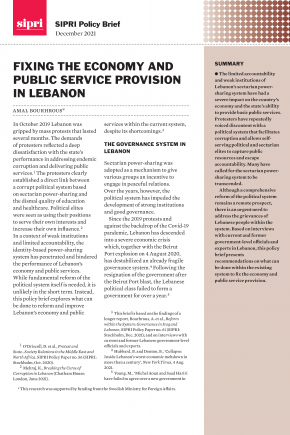Fixing the Economy and Public Service Provision in Lebanon
The limited accountability and weak institutions of Lebanon’s sectarian power-sharing system have had a severe impact on the country’s economy and the state’s ability to provide basic public services. Protesters have repeatedly voiced discontent with a political system that facilitates corruption and allows self-serving political and sectarian elites to capture public resources and escape accountability. Many have called for the sectarian power-sharing system to be transcended.
Although a comprehensive reform of the political system remains a remote prospect, there is an urgent need to address the grievances of Lebanese people within the system. Based on interviews with current and former government-level officials and experts in Lebanon, this policy brief presents recommendations on what can be done within the existing system to fix the economy and public service provision.
The governance system in Lebanon
Unprecedented economic collapse
Failing public services
Recommendations

